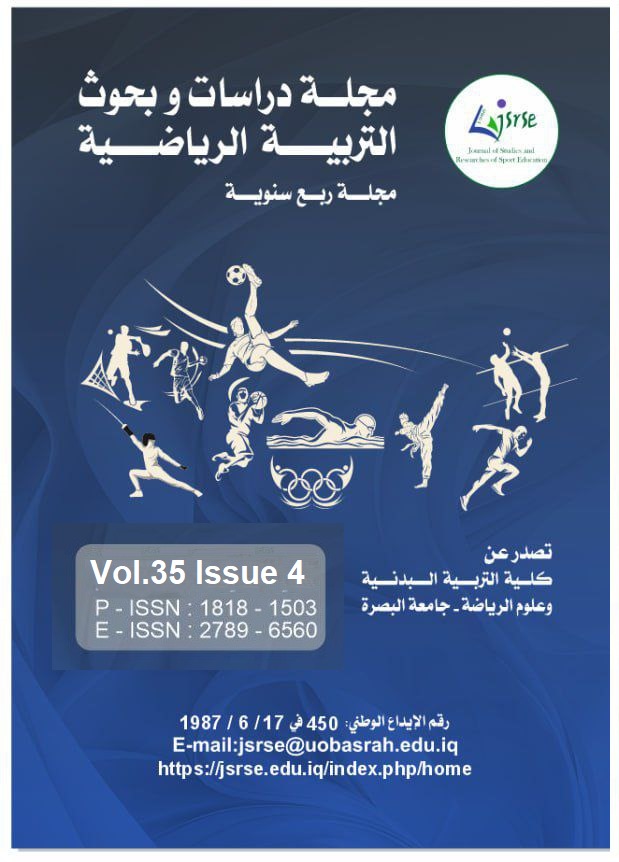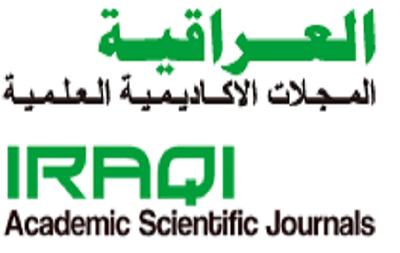The impact of the dimensions of political skills of leaders in physical training centers for trainees of the Popular Mobilization Authority from their point of view
Main Article Content
Abstract
The research aimed to identify the dimensions of political skills among leaders in the physical training centers for trainees of the Popular Mobilization Authority, from their perspectives. The researchers used a descriptive approach, as it suited the nature of the research. The research community consisted of trainees in the physical training centers of the Popular Mobilization Authority. The sample, numbering (480), was intentionally selected. The researchers concluded that leadership directly impacts performance enhancement. This impact increases and is magnified through behavior, vision, hope/faith, values, attitudes, and spirituality. They also work to ensure the activation and facilitation of communication processes between employees and enable the making of certain decisions that work towards achieving goals. The researchers' most important recommendations are to increase attention to instilling values and attitudes in trainees and enhancing their behavior, as well as developing spirituality, which is reinforced by belief in the vision of the Popular Mobilization Authority and the pursuit of its goals
Article Details

This work is licensed under a Creative Commons Attribution-NonCommercial 4.0 International License.
References
Abdul Halim, J., & Haider, H. H. (2020). An analytical study of the sources of leadership power according to the dimension of experience power for coaches in sports clubs of the Iraqi Premier League from the players’ point of view. Journal of Sports Education Studies and Research.
Ahmed, S. O. (1993). Measurement and evaluation in the teaching process: Vol. 2nd edition. Dar Al-Amal.
Al-Jalil, A. B. A., Zaid, I. M. A., & Nazzal, A. H. (2022). An analytical study of the media in covering women’s sporting events. Sciences Journal Of Physical Education, 15(Conference 8-1).
Bilal, B. A.-S. (2012). Work Ethics: Vol. first edition. Dar Al-Masirah for Printing and Publishing.
Farahat, L. A.-S. (2001). Mathematical Cognitive Measurement (p. 19). Al-Kitab Publishing Center.
Farhat, L. E.-S. (2001). Measurement and testing in physical education. Cairo: Book Center for Publishing.
Fayez Jumaa Al-Najjar et al. (2010). Scientific research methods - an applied perspective: Vol. 2nd edition. Dar Al-Hamid.
Hadi, Z. S. A., Hamood, A. G., & Nazzal, A. H. J. (2025). An analytical study of the role of technology for the coach in training behavior from the players’ point of view in the Iraqi Premier League. Journal of Studies and Researches of Sport Education, 35(1). https://doi.org/https://doi.org/10.55998/jsrse.v35i1.832
Khadir, Z. J., & Nazzal, A. H. J. (2021). An Analytical Study of the Level of Empowerment among Football Coaches from the Players’ Perspective. Journal of Sports Education Studies and Research, 31(1), 102–112. https://www.jsrse.edu.iq/index.php/home/article/view/82
Muhammad, H. A., & Radwan, M. N. al-D. (2002). Measurement in Physical Education and Sports Psychology. Dar Al-Fikr Al-Arabi.
Mukhlif, M. M., Asil, F. H., & Shallal, M. H. (2019). The Effect of Using Competitive Exercise in Motor Fitness and Speed of Transition for Football Players (Junior Class). Indian Journal of Public Health Research & Development, 10(10), 2410. https://doi.org/10.5958/0976-5506.2019.03221.2
Nazzal, A. H. J. (2012). Measuring the level of competencies of sports tourism planning in Basra Governorate, building and applying it. Journal of Physical Education Studies and Research, 36.
Raysan Khuraibit. (1987). Research Methods in Physical Education. Dar Al-Kutub Directorate for Printing and Publishing.
Shaker, M. J. (1990). Comparative Vocational Guidance and Educational Counseling Systems (p. 144). University of Basra, Higher Education Press.





 IASJ
IASJ CC-BY-4.0
CC-BY-4.0 turnitin
turnitin ISSN
ISSN DOAJ
DOAJ Crossref
Crossref GoogleScholar
GoogleScholar Orcid
Orcid